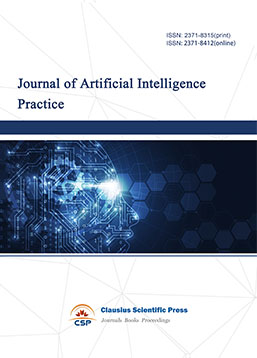COVID-19 Prevention and Control System Based on RFID
DOI: 10.23977/acss.2022.060608 | Downloads: 10 | Views: 1473
Author(s)
Fan Lu 1, Xiuqing Chen 1, Jiahao Li 1, Lei Kai 1, Ziyan Liu 1, Jianqiang Guo 1
Affiliation(s)
1 School of Medical Information and Engineering, Xuzhou Medical University, Xuzhou, Jiangsu, China
Corresponding Author
Xiuqing ChenABSTRACT
Radio Frequency Identification (RFID) is a part of Internet of Things (IoT), using low-cost RFID tag to communicate. RFID plays an important role in COVID-19. Researchers have proposed RFID authentication systems for e-healthcare to address the issue of privacy leakage. However, it is significant to propose a lightweight and secure protocol for medical systems due to the weak computing power of the tag. We present an innovative and lightweight RFID authentication system using cloud technology, and we use the expanded formal security model to demonstrate the proposed protocol's security. The security model has an unstable channel between servers and readers, and we use the informal investigation to demonstrate how secure our protocol is. Through these analysis, our scheme can resist the common attacks, forward attacks and backward attacks and retain mutual authentication, information integrity. Moreover, tags and readers can be anonymous.
KEYWORDS
RFID, COVID-19, Cloud technology, Mutual authenticationCITE THIS PAPER
Fan Lu, Xiuqing Chen, Jiahao Li, Lei Kai, Ziyan Liu, Jianqiang Guo, COVID-19 Prevention and Control System Based on RFID. Advances in Computer, Signals and Systems (2022) Vol. 6: 44-49. DOI: http://dx.doi.org/10.23977/acss.2022.060608.
REFERENCES
[1] Agrahari A K, Varma S, (2021) A Provably Secure RFID Authentication Protocol Based on ECQV for the Medical Internet of Things, Peer-to-Peer Networking and Applications, vol.14, no.5, pp. 1277-1289.
[2] Tayyaba S, Khalid W, Ashraf M W, and Balas V E, (2021) Principles and Paradigms in IoT-Based Healthcare Using RFID, Healthcare Paradigms in the Internet of Things Ecosystem, vol.12, no.8, pp. 251-269.
[3] Khan H A, Abdulla R, Selvaperumal S K, and Bathich A, (2021) IoT Based on Secure Personal Healthcare Using RFID Technology and Steganography, International Journal of Electrical and Computer Engineering, vol.11, no.4, pp. 2088-8708.
[4] Niu B, Zhu X, Chi H, and Li H, (2014) Privacy and Authentication Protocol for Mobile RFID Systems, Wireless Personal Communications, vol.77, no.3, pp. 1713-1731.
[5] Rajasekar S, (2021) An Enhanced IoT Based Tracing and Tracking Model for COVID-19 Cases, SN Computer Science, vol.2, no.1, pp. 1-16.
[6] Lim G C L, Arada G P, Abad A C, and Magsino E R, (2021) RFID Tag Data Encryption Using Triple DES and RSA Algorithms, Journal of Physics: Conference Series, vol.1997, no.1, pp. 12-28.
[7] Mondal S, Kumar D, Chahal P, (2021) Recent Advances and Applications of Passive Harmonic RFID Systems: A Review, Micromachines, vol.12, no.4, pp. 4-20.
[8] Kumar A, Jain A K, Dua M, (2021) A Comprehensive Taxonomy of Security and Privacy Issues in RFID, Complex & Intelligent Systems, vol.7, no.3, pp. 1327-1347.
[9] Chen C L, Lim Z Y, Liao H C, Deng Y Y and Chen P, (2021) A Traceable and Verifiable Tobacco Products Logistics System with GPS and RFID Technologies, Applied Sciences, vol.11, no.11, pp. 1-36.
[10] Ai X, Chen H, Lin K, Wang Z and Yu J, (2020) Nowhere to Hide: Efficiently Identifying Probabilistic Cloning Attacks in Large-Scale RFID Systems, IEEE Transactions on Information Forensics and Security, vol.16, no.3, pp. 1-10.
[11] Ali U, (2021) RFID Authentication Scheme Based on Hyperelliptic Curve Signcryption, IEEE Access, vol.14, no.99, pp. 1-1.
| Downloads: | 43158 |
|---|---|
| Visits: | 943345 |
Sponsors, Associates, and Links
-
Power Systems Computation

-
Internet of Things (IoT) and Engineering Applications

-
Computing, Performance and Communication Systems

-
Journal of Artificial Intelligence Practice

-
Journal of Network Computing and Applications

-
Journal of Web Systems and Applications

-
Journal of Electrotechnology, Electrical Engineering and Management

-
Journal of Wireless Sensors and Sensor Networks

-
Journal of Image Processing Theory and Applications

-
Mobile Computing and Networking

-
Vehicle Power and Propulsion

-
Frontiers in Computer Vision and Pattern Recognition

-
Knowledge Discovery and Data Mining Letters

-
Big Data Analysis and Cloud Computing

-
Electrical Insulation and Dielectrics

-
Crypto and Information Security

-
Journal of Neural Information Processing

-
Collaborative and Social Computing

-
International Journal of Network and Communication Technology

-
File and Storage Technologies

-
Frontiers in Genetic and Evolutionary Computation

-
Optical Network Design and Modeling

-
Journal of Virtual Reality and Artificial Intelligence

-
Natural Language Processing and Speech Recognition

-
Journal of High-Voltage

-
Programming Languages and Operating Systems

-
Visual Communications and Image Processing

-
Journal of Systems Analysis and Integration

-
Knowledge Representation and Automated Reasoning

-
Review of Information Display Techniques

-
Data and Knowledge Engineering

-
Journal of Database Systems

-
Journal of Cluster and Grid Computing

-
Cloud and Service-Oriented Computing

-
Journal of Networking, Architecture and Storage

-
Journal of Software Engineering and Metrics

-
Visualization Techniques

-
Journal of Parallel and Distributed Processing

-
Journal of Modeling, Analysis and Simulation

-
Journal of Privacy, Trust and Security

-
Journal of Cognitive Informatics and Cognitive Computing

-
Lecture Notes on Wireless Networks and Communications

-
International Journal of Computer and Communications Security

-
Journal of Multimedia Techniques

-
Automation and Machine Learning

-
Computational Linguistics Letters

-
Journal of Computer Architecture and Design

-
Journal of Ubiquitous and Future Networks


 Download as PDF
Download as PDF